The worldwide popularity of Scotch whisky has inevitably attracted all kinds of fakes, including some that could put drinkers at risk. Now the whisky industry is fighting back. In this special report, we look at how Thailand is using some ingenious methods to deal with a growing problem
By Maxmilian Wechsler
By Maxmilian Wechsler
| WITH consumers the world over rapidly acquiring a taste for whiskies and other premium drink products, it will come as no surprise to learn that the number of counterfeiters and smugglers trying to cash in on this booming business is also on the increase – and they include persistent offenders here in Thailand. High on their target list of fake and smuggled products is Scotch whisky, one of the UK’s most valuable exports worth 4.3 billion UK pounds in 2012, representing an astonishing 25% of all Britain’s food and export drinks. It’s little wonder that the British government and the Scotch Whisky Association (SWA), the industry’s watchdog, are seriously concerned about counterfeiting and smuggling. Aside from Thailand, other countries pinpointed by the SWA where illicit alcoholic liquor is produced in significant quantities include China, India, Italy, the Dutch territory of Curacao in the Caribbean, and Australia. |
No figures are available for the worldwide loss incurred by the Scotch whisky industry, but it thought to be in the millions of pounds.
Now the whisky industry in Scotland, which employs more than 10,000 people, is tackling the problem of forgeries and protection of its brand through a legal device known as a “geographical indication” or GI, in a number of markets, including India, Turkey, China and Thailand, according to the SWA.
GI means Scotch whisky is recognised as a product that can only be made in Scotland according to the Scotch Whisky Regulations 2009. This covers drinks that are passed off as Scotch whisky through their labeling, packaging and names.
In 2012, Thailand was Scotch whisky’s 10th largest export market by volume, with a value of 39 million UK pounds, according to SWA. The most valuable market for Scotch is the US, followed by France, Singapore, Spain, Germany, Taiwan, South Africa, South Korea, Venezuela, and Mexico.
Although Scotch whisky has been a protected GI in Thailand since 2009, the SWA is apparently not entirely satisfied with the measures taken here. Its director of legal affairs, Glen Barclay, said after meetings here with the Thai Department of Intellectual Property (DIP), the British Embassy and the EU officials: “A number of legal issues still need to be addressed: incomplete implementation of the WTO TRIPS Agreement on the protection of geographical indications; and lack of enforcement – there is confusion as to which enforcement agency is responsible for unfair competition issues; and that the quality and consistency of decisions over trade mark protection are mixed.
He noted that there is no compulsory definition of whisky here, and suggested that education and training was needed by enforcement agencies regarding intellectual property matters.
The value of Scotch exports has now increased by 87% over the last 10 years. Interestingly, exports of single malt have risen by 190% during that period, reflecting improved consumer knowledge of Scotch whisky across the globe.
Meanwhile, Australia has been branded as “one of the worst markets for the sale of fake Scotch whisky,” by lawyers acting on behalf of the SWA.
Mr Barclay has added that some Australian companies were diluting Scotch with other spirits and then trying to pass it off as whisky, while others are taking cheap whiskies and adding oak staves to try to make them taste older than they are.
In India, courts have halted the sale of several whisky brands after being accused of passing off local liquor as authentic Scotch whisky through their labelling and packaging.
The SWA said the injunction bars the two firms from including reference to “Scotch whisky” on drinks that are not genuine Scotch whisky. It also prevents the sale of their local whiskies under the trademark or trade name “Glenmon” or any name with the word “Glen” in it.
“The defendants have indirectly misled the general public by using the word ‘Glenmon’. They are directly misleading the general public by using the words ‘Scotch whisky’. Such dishonest adoption of brand names invites an order of injunction,” said the SWA.
In order to be called Scotch whisky, the beverage must be produced at a distillery in Scotland and meet various other stringent regulations.
In China, a wholesaler was sentenced to four years in prison and fined £50,000 for misusing the term “Scotch whisky.” Some of the products were labelled as Scotch whisky when actually they were Chinese spirits containing artificial flavouring.
The SWA has taken action against more than 1,000 brands and opposed the registration of some 3,000 trademarks. – C.H.
Now the whisky industry in Scotland, which employs more than 10,000 people, is tackling the problem of forgeries and protection of its brand through a legal device known as a “geographical indication” or GI, in a number of markets, including India, Turkey, China and Thailand, according to the SWA.
GI means Scotch whisky is recognised as a product that can only be made in Scotland according to the Scotch Whisky Regulations 2009. This covers drinks that are passed off as Scotch whisky through their labeling, packaging and names.
In 2012, Thailand was Scotch whisky’s 10th largest export market by volume, with a value of 39 million UK pounds, according to SWA. The most valuable market for Scotch is the US, followed by France, Singapore, Spain, Germany, Taiwan, South Africa, South Korea, Venezuela, and Mexico.
Although Scotch whisky has been a protected GI in Thailand since 2009, the SWA is apparently not entirely satisfied with the measures taken here. Its director of legal affairs, Glen Barclay, said after meetings here with the Thai Department of Intellectual Property (DIP), the British Embassy and the EU officials: “A number of legal issues still need to be addressed: incomplete implementation of the WTO TRIPS Agreement on the protection of geographical indications; and lack of enforcement – there is confusion as to which enforcement agency is responsible for unfair competition issues; and that the quality and consistency of decisions over trade mark protection are mixed.
He noted that there is no compulsory definition of whisky here, and suggested that education and training was needed by enforcement agencies regarding intellectual property matters.
The value of Scotch exports has now increased by 87% over the last 10 years. Interestingly, exports of single malt have risen by 190% during that period, reflecting improved consumer knowledge of Scotch whisky across the globe.
Meanwhile, Australia has been branded as “one of the worst markets for the sale of fake Scotch whisky,” by lawyers acting on behalf of the SWA.
Mr Barclay has added that some Australian companies were diluting Scotch with other spirits and then trying to pass it off as whisky, while others are taking cheap whiskies and adding oak staves to try to make them taste older than they are.
In India, courts have halted the sale of several whisky brands after being accused of passing off local liquor as authentic Scotch whisky through their labelling and packaging.
The SWA said the injunction bars the two firms from including reference to “Scotch whisky” on drinks that are not genuine Scotch whisky. It also prevents the sale of their local whiskies under the trademark or trade name “Glenmon” or any name with the word “Glen” in it.
“The defendants have indirectly misled the general public by using the word ‘Glenmon’. They are directly misleading the general public by using the words ‘Scotch whisky’. Such dishonest adoption of brand names invites an order of injunction,” said the SWA.
In order to be called Scotch whisky, the beverage must be produced at a distillery in Scotland and meet various other stringent regulations.
In China, a wholesaler was sentenced to four years in prison and fined £50,000 for misusing the term “Scotch whisky.” Some of the products were labelled as Scotch whisky when actually they were Chinese spirits containing artificial flavouring.
The SWA has taken action against more than 1,000 brands and opposed the registration of some 3,000 trademarks. – C.H.
Fake whisky in Thailand
COUNTERFEITING of alcoholic drinks has been going on in Thailand for decades. Brands targeted include cognacs like Rémy Martin, Hennessy and Martel; vodka - especially Absolut and Grey Goose - and wines such as Carlo Rossi Wine and Chateau Lafite Rothschild. Even beer has been copied.
Fake whiskies include Teacher’s, Jack Daniel’s and Glenfiddich. But it is Johnnie Walker, the most widely distributed brand of blended whisky in the world that seems to attract the greatest interest from counterfeiters here.
Thailand is ranked third after the US and Brazil among 180 markets for Johnnie Walker whisky sales for the third consecutive year.
The suppression of counterfeit alcoholic beverages has traditionally been handled in Thailand by the Royal Thai Police, but recently the Department of Special Investigation (DSI) stepped in following a complaint received from the Verisec, a firm hired by Diaego Moet Hennessy (Thailand), which is responsible for Johnnie Walker products here.
Verisec specializes in brand protection, intellectual property consulting and corporate investigations.
“After our bureau received the complaint, we were given information from the company and also samples of counterfeit Johnnie Walker Red Label and Black Label bottles obtained from a retail outlet. We conducted a further investigation that lasted for about two weeks and presented the evidence we gathered to the Central Intellectual Property and International Trade Court, with a request for a search warrant, which was granted by the judge,” said Police Lieutenant Colonel Sumit Chanovit, Director of Section 1 of the DSI’s Intellectual Property Crime Bureau.
“Armed with the search warrant, a team of about 20 DSI officers led by Pol Lt Col Sumit along with several Verisec representatives raided a liquor shop and storage facility in Bang Bua Thong district of Nonthaburi province near Bangkok on May 22 this year. We found and seized 595 one-liter bottles of counterfeit Johnnie Walker, both Red and Black label. We arrested the owner, Khun Bang-on Taikam, and charged her with trademark violation.”
“Khun Bang-on was released on 100,000 baht bail. If convicted, she could face a fine of up to 400,000 baht and a jail term not exceeding four years, or both. The shop was selling both fake labels for the price of the originals,” Pol Lt Col Sumit said.
“We don’t know where the fake whiskey was produced but we strongly suspect it was in Thailand. When we asked the suspect where she got it, she said that someone came to her shop and offered it to her and she had no idea it was not genuine. We believe that she did know it was not the genuine product, however.
“In fact, the seized bottles contained genuine Johnnie Walker whisky mixed with other brands of cheap whiskey. The blend was not physically harmful to the consumer, only of much lesser quality.”
Pol Lt Col Sumit said that in the past there had been seizures of counterfeit Johnnie Walker and other fake alcoholic drinks in Thailand that contained harmful, toxic chemicals. “When you opened the bottle it smelled like gasoline. The manufacturers obviously intended to cheat the customers and didn’t care about the consequences.”
In 2003, the Food Standards Agency in the UK issued a health warning about whisky contaminated with unacceptable levels of methanol. Bottles of contaminated Johnnie Walker Black Label containing methanol were discovered by the Customs Department and police at a bottling plant in Berkshire.
Tests carried out on the counterfeit whisky “show that it has been contaminated with methanol. At the levels detected, consumers would be at risk of harmful effects including severe stomach pain and blindness.”
Johnnie Walker Scotch is now the most widely distributed brand of blended whisky in the world, selling annually about 130 million bottles worldwide.
Asked how consumers can identify genuine Johnnie Walker from counterfeit brands on store shelves, Pol Lt Col Sumit replied: “This is not easy. I compared the packaging and bottles seized by the DSI with the original product smuggled from a neighboring country, but couldn’t detect any differences on the outside. The bottles and the boxes appeared to be the same.
“The staff of Verisec possesses a special tool that will immediately identify whether the Johnnie Walker is original or counterfeit. The DSI doesn’t possess this equipment,” continued the Pol Lt Col. The device is placed on the top of the bottle; if it is original a green light will come on, and if counterfeit a red light shows, apparently due to a code introduced in the packaging process.
COUNTERFEITING of alcoholic drinks has been going on in Thailand for decades. Brands targeted include cognacs like Rémy Martin, Hennessy and Martel; vodka - especially Absolut and Grey Goose - and wines such as Carlo Rossi Wine and Chateau Lafite Rothschild. Even beer has been copied.
Fake whiskies include Teacher’s, Jack Daniel’s and Glenfiddich. But it is Johnnie Walker, the most widely distributed brand of blended whisky in the world that seems to attract the greatest interest from counterfeiters here.
Thailand is ranked third after the US and Brazil among 180 markets for Johnnie Walker whisky sales for the third consecutive year.
The suppression of counterfeit alcoholic beverages has traditionally been handled in Thailand by the Royal Thai Police, but recently the Department of Special Investigation (DSI) stepped in following a complaint received from the Verisec, a firm hired by Diaego Moet Hennessy (Thailand), which is responsible for Johnnie Walker products here.
Verisec specializes in brand protection, intellectual property consulting and corporate investigations.
“After our bureau received the complaint, we were given information from the company and also samples of counterfeit Johnnie Walker Red Label and Black Label bottles obtained from a retail outlet. We conducted a further investigation that lasted for about two weeks and presented the evidence we gathered to the Central Intellectual Property and International Trade Court, with a request for a search warrant, which was granted by the judge,” said Police Lieutenant Colonel Sumit Chanovit, Director of Section 1 of the DSI’s Intellectual Property Crime Bureau.
“Armed with the search warrant, a team of about 20 DSI officers led by Pol Lt Col Sumit along with several Verisec representatives raided a liquor shop and storage facility in Bang Bua Thong district of Nonthaburi province near Bangkok on May 22 this year. We found and seized 595 one-liter bottles of counterfeit Johnnie Walker, both Red and Black label. We arrested the owner, Khun Bang-on Taikam, and charged her with trademark violation.”
“Khun Bang-on was released on 100,000 baht bail. If convicted, she could face a fine of up to 400,000 baht and a jail term not exceeding four years, or both. The shop was selling both fake labels for the price of the originals,” Pol Lt Col Sumit said.
“We don’t know where the fake whiskey was produced but we strongly suspect it was in Thailand. When we asked the suspect where she got it, she said that someone came to her shop and offered it to her and she had no idea it was not genuine. We believe that she did know it was not the genuine product, however.
“In fact, the seized bottles contained genuine Johnnie Walker whisky mixed with other brands of cheap whiskey. The blend was not physically harmful to the consumer, only of much lesser quality.”
Pol Lt Col Sumit said that in the past there had been seizures of counterfeit Johnnie Walker and other fake alcoholic drinks in Thailand that contained harmful, toxic chemicals. “When you opened the bottle it smelled like gasoline. The manufacturers obviously intended to cheat the customers and didn’t care about the consequences.”
In 2003, the Food Standards Agency in the UK issued a health warning about whisky contaminated with unacceptable levels of methanol. Bottles of contaminated Johnnie Walker Black Label containing methanol were discovered by the Customs Department and police at a bottling plant in Berkshire.
Tests carried out on the counterfeit whisky “show that it has been contaminated with methanol. At the levels detected, consumers would be at risk of harmful effects including severe stomach pain and blindness.”
Johnnie Walker Scotch is now the most widely distributed brand of blended whisky in the world, selling annually about 130 million bottles worldwide.
Asked how consumers can identify genuine Johnnie Walker from counterfeit brands on store shelves, Pol Lt Col Sumit replied: “This is not easy. I compared the packaging and bottles seized by the DSI with the original product smuggled from a neighboring country, but couldn’t detect any differences on the outside. The bottles and the boxes appeared to be the same.
“The staff of Verisec possesses a special tool that will immediately identify whether the Johnnie Walker is original or counterfeit. The DSI doesn’t possess this equipment,” continued the Pol Lt Col. The device is placed on the top of the bottle; if it is original a green light will come on, and if counterfeit a red light shows, apparently due to a code introduced in the packaging process.
“The Verisec people accompanied us during the search in May and checked every bottle with the device. It was our first case involving counterfeit Johnnie Walker whisky. We can’t go alone because we don’t have this special tool. It is not like when we investigate and seize fake watches, leather and garment products or pirated DVDs. In these cases we can easily identify the originals from counterfeits,” Pol Lt Col said.
“There are some other ways to identify counterfeit Johnnie Walker from the original but I can’t disclose them because if published it could help the counterfeiters. But no question, the special device is the most accurate way to distinguish the real from the fake.”
Pol Lt Col Sumit stressed that to find counterfeit Johnnie Walker whisky is Thailand is not easy.
“The probability that you will be sold counterfeit Johnnie Walker is very low in Thailand. You can absolutely trust all big stores here.”
The entertainment industry is particularly prone to fake products. “We suspect that some pubs, restaurants, clubs and discotheques may offer complimentary branded whisky during various promotions which is, in fact, a counterfeit product. Most of these establishments know what they are serving is fake, but order it in order to reduce costs,” said Pol Lt Col Sumit.
“The criminals collect genuine empty bottles of popular spirits from the garbage or buy them from entertainment places,” Pol Lt Col Sumit warned.
Smuggled Johnnie Walker at Klong Toey
FINDING out whether counterfeit Johnnie Walker is for sale in places like Klong Toey market is difficult because fakes are difficult to identify, as Pol Lt Col Sumit mentioned. At stores visited by a team of reporters, Johnnie Walker on sale carried approximately the same price as the genuine article.
However, it was possible to locate smuggled Johnnie Walker Black and Red in an area accessible to authorized people only. It wasn’t difficult to find a ‘salesman’ and through him, reporters were able to by one-litre bottles of smuggled Red Label for 550 baht and Black Label for 900 baht. A large liquor store in Bangkok sells the same genuine items for 829 and 1,349 baht respectively.
The Red Label purchased was wrapped in a black plastic bag with a sticker attached to the top of the bottle that said “Duty not paid.” Our reporters were told that it was possible to buy this particular brand at any time and in large quantities. Other brands of alcohol, including wines are allegedly sold cheaply at the port as well.
The bottle was later examined by Pol Lt Col Sumit, who could identify from a “secret” mark on the bottle that it was smuggled from Malaysia.
Counterfeit Johnnie Walker is available at Klong Toey but only sold to selected merchants. Foreigners normally have very little chance of tracking down counterfeit or smuggled Johnnie Walker because the sellers don’t trust them as they could be working for the company or for the government.
“There are some other ways to identify counterfeit Johnnie Walker from the original but I can’t disclose them because if published it could help the counterfeiters. But no question, the special device is the most accurate way to distinguish the real from the fake.”
Pol Lt Col Sumit stressed that to find counterfeit Johnnie Walker whisky is Thailand is not easy.
“The probability that you will be sold counterfeit Johnnie Walker is very low in Thailand. You can absolutely trust all big stores here.”
The entertainment industry is particularly prone to fake products. “We suspect that some pubs, restaurants, clubs and discotheques may offer complimentary branded whisky during various promotions which is, in fact, a counterfeit product. Most of these establishments know what they are serving is fake, but order it in order to reduce costs,” said Pol Lt Col Sumit.
“The criminals collect genuine empty bottles of popular spirits from the garbage or buy them from entertainment places,” Pol Lt Col Sumit warned.
Smuggled Johnnie Walker at Klong Toey
FINDING out whether counterfeit Johnnie Walker is for sale in places like Klong Toey market is difficult because fakes are difficult to identify, as Pol Lt Col Sumit mentioned. At stores visited by a team of reporters, Johnnie Walker on sale carried approximately the same price as the genuine article.
However, it was possible to locate smuggled Johnnie Walker Black and Red in an area accessible to authorized people only. It wasn’t difficult to find a ‘salesman’ and through him, reporters were able to by one-litre bottles of smuggled Red Label for 550 baht and Black Label for 900 baht. A large liquor store in Bangkok sells the same genuine items for 829 and 1,349 baht respectively.
The Red Label purchased was wrapped in a black plastic bag with a sticker attached to the top of the bottle that said “Duty not paid.” Our reporters were told that it was possible to buy this particular brand at any time and in large quantities. Other brands of alcohol, including wines are allegedly sold cheaply at the port as well.
The bottle was later examined by Pol Lt Col Sumit, who could identify from a “secret” mark on the bottle that it was smuggled from Malaysia.
Counterfeit Johnnie Walker is available at Klong Toey but only sold to selected merchants. Foreigners normally have very little chance of tracking down counterfeit or smuggled Johnnie Walker because the sellers don’t trust them as they could be working for the company or for the government.

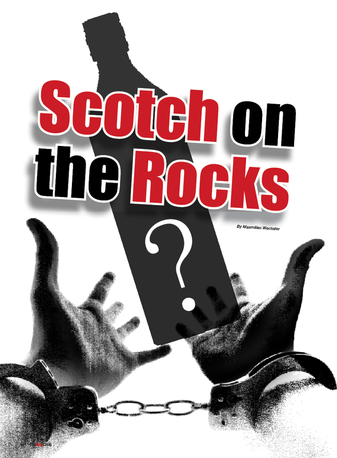
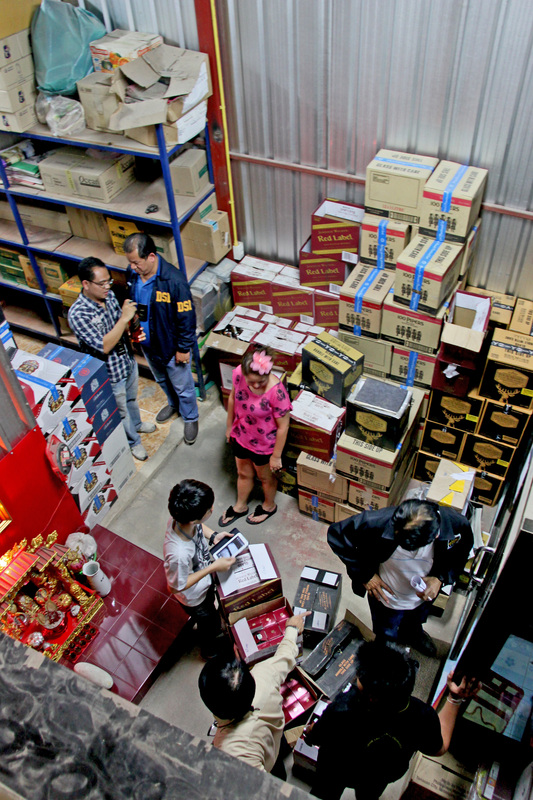
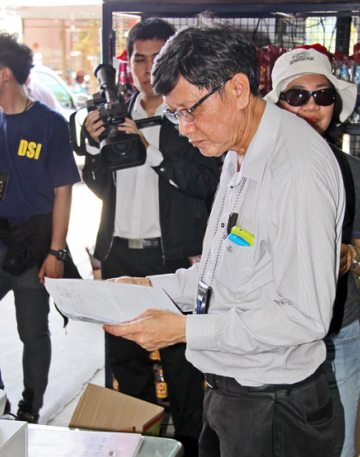
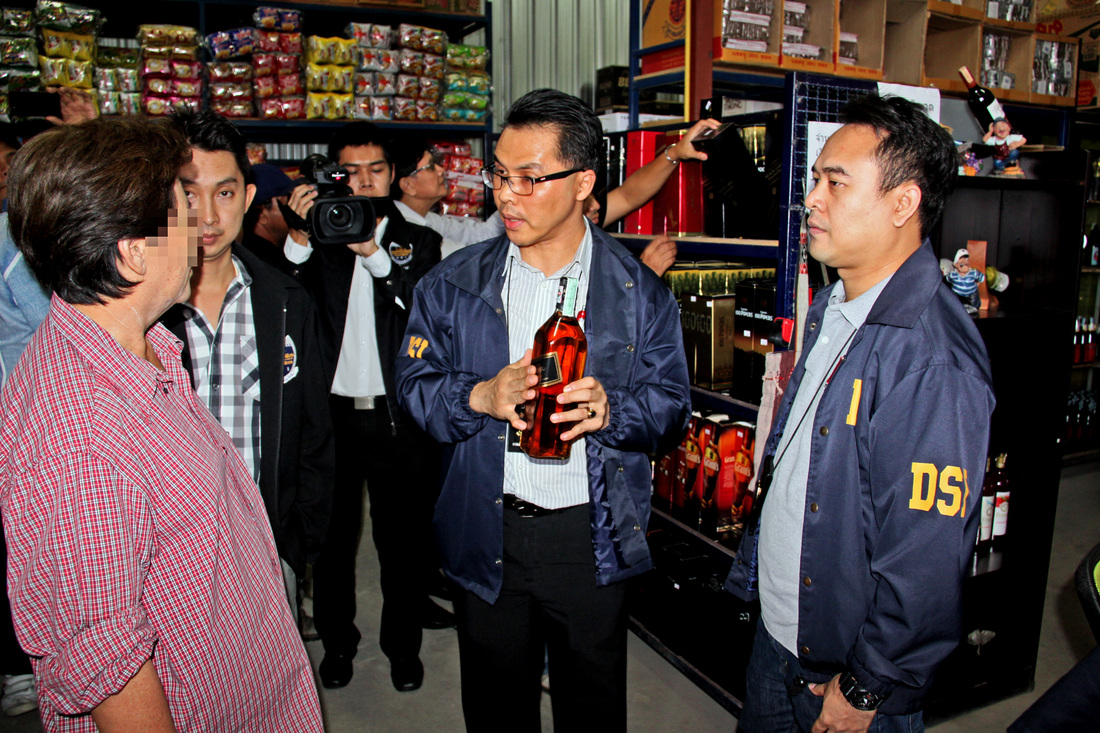
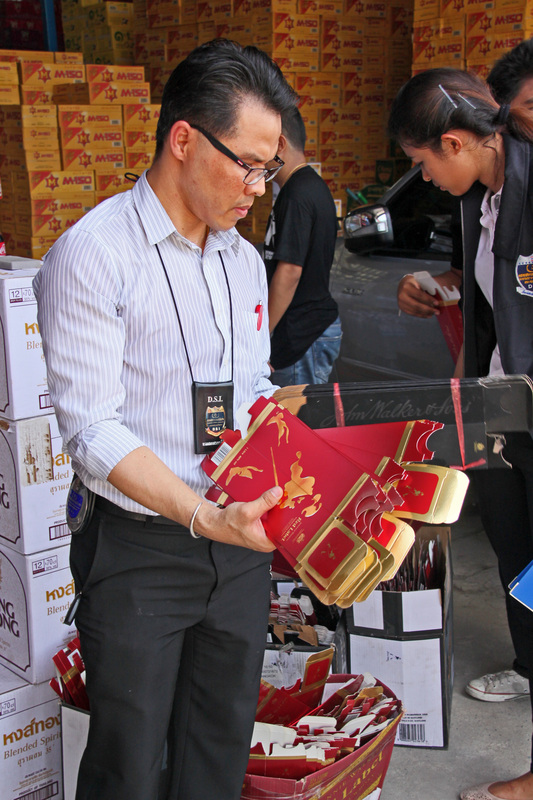
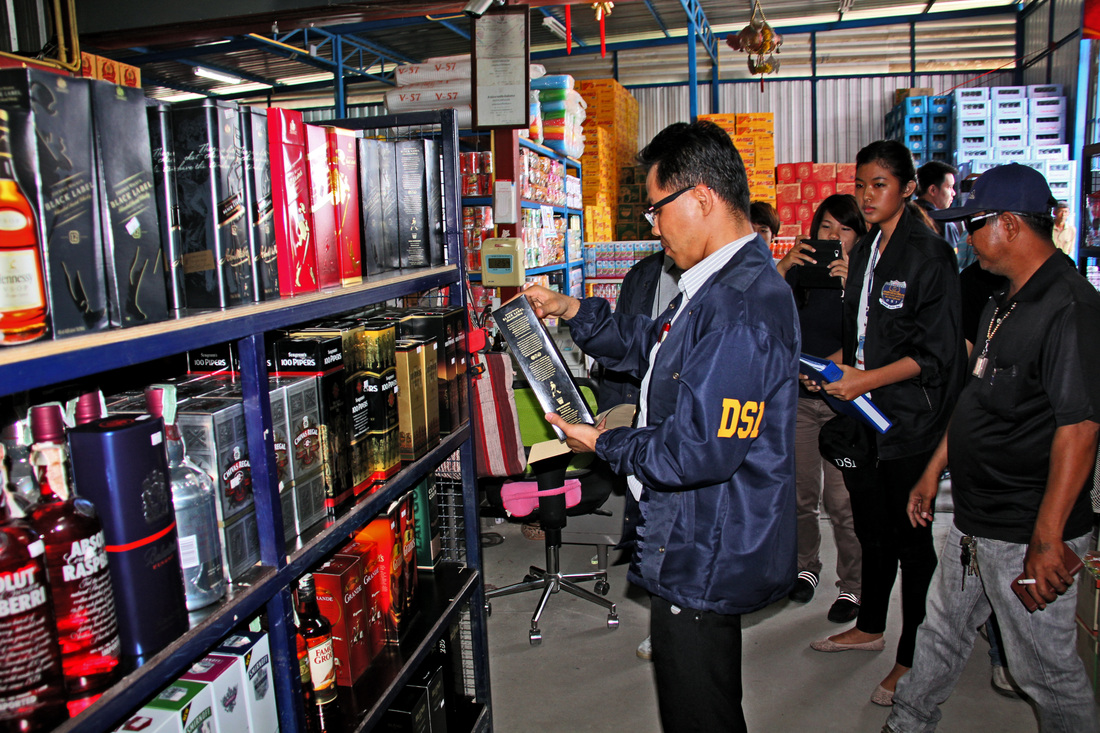
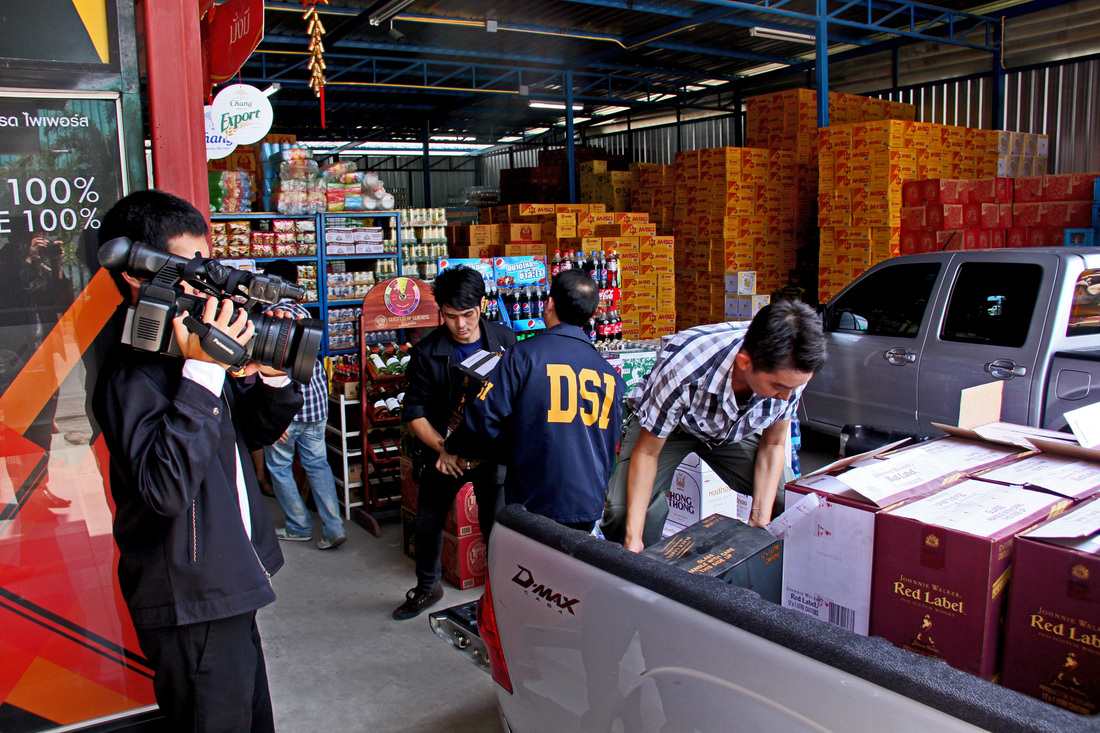
 RSS Feed
RSS Feed
















